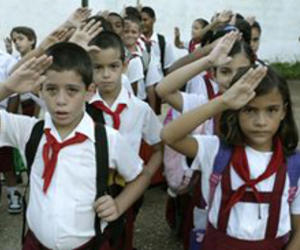Latin lessons: What can we learn from the world’s most ambitious literacy campaign? Part 3
- Submitted by: manso
- Editorial Articles
- 11 / 09 / 2010

Sunday, 7 November 2010.By: JOSE GOITIA. Fifty years ago this month, Cuba committed itself to teach every citizen basic literacy. Today, the country's education system is the envy of the rest of the world. Nina Lakhani travels to Havana to discover the story behind the success – and ask why some believe that cracks are starting to show...
The Cuban programme continues to be adapted for use all over the world, including in Canada, Venezuela and among Maori people in New Zealand today. But, insists Professor Macdonald, the speed and extent of Cuba's advances in literacy struggle to be replicated elsewhere without the same political commitment to education and social change.
Furthering this argument, Bill Greenshields, the former president of the UK's National Union of Teachers, believes that the achievements of the Cuban education system are so inextricably linked to its socialist principles, that they remain unpalatable, and largely overlooked, by many governments not so disposed to Cuba's politics.
Indeed, even in Cuba, the great experiment has been beset by problems of late. In recent years, there has been an exodus of secondary-school teachers, seeking to earn "hard currency" by working with tourists as taxi drivers, guides or in hotels, according to Valle from the education union. Attempts to fill the gap by using intensive teacher-training courses for young people barely out of school, and introducing a generalist degree, attracted widespread criticism and have recently been abandoned.
The exodus is, in fact, a symptom of a wider problem, which has become more pronounced since visa restrictions were eased to encourage more tourists, and their dollars. Cubans meet these incomers, see their fashionable clothes, hear about their lifestyles, and many obviously want the same opportunities to travel and earn money. Some are even talking of a "crisis in education".
"A youngster sees that his dad is a doctor, his mum is a teacher, his uncle an engineer, and yet the family cannot afford a TV or nice clothes," says primary-school teacher Julio Gomez. "So they think, 'I'm better off working with tourists.' This is a problem for teaching, for our education [system], but also for the country."
Valle, however, is confident that the Cuban education system will not only survive, but will continue to reform and improve. "Here we are always seeking for a perfect system; that is the way it has been for 50 years. When we encounter problems, we introduce modifications; the next is always better than the last. It is true that many teachers have left because of the economic situation; wanting more money is a reasonable desire. But teaching remains a very respected profession. We have introduced a new minimum salary and modified the training, so I am confident that we will resolve this crisis as well."
Yet Professor Macdonald is less certain that the Cuban system can survive, at least within its own borders. "The Cuban model is at the vanguard of education, and health, but its future in a neo-liberal [market-driven] world is grim. There is an increasing shift towards appreciating and copying the Cuban system in Latin America and many other countries such as Malawi and Pakistan."
Source:www.independent.co.uk/news/world/americas/
Comments